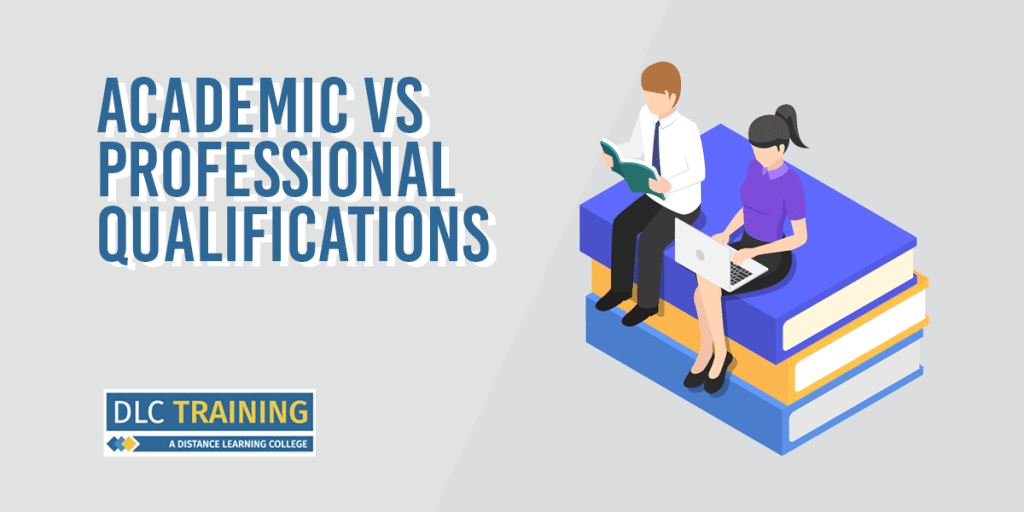When deciding how to take steps forward for career development, many people often find themselves at a crossroads between academic and professional qualifications. While both routes offer benefits, it’s important to understand their differences in order to make an informed decision. Afterall, this decision will affect how your career progresses and takes shape.

What Are Academic Qualifications?
Academic qualifications are diplomas, degrees, and other certifications studied through colleges and universities. These qualifications are often associated with theoretical knowledge, research, and critical thinking skills. Pursuing academic qualifications involves diving deep into a specific field of study. This is often done by structured coursework, examinations, and research projects.
Pros and Cons of Academic Qualifications
When comparing the two, it’s important to consider their advantages and disadvantages. Some advantages include:
- Broad-based learning
- Recognition
Broad-based learning
A key advantage for academic qualifications is their emphasis on broad-based learning. Learners engage with different perspectives and theories. This provides a well-rounded understanding of the chosen discipline.
Recognition
Additionally, academic credentials are widely recognised and respected. Many employers request degree-level qualifications when recruiting new employees as a standard. Having these qualifications can therefore open doors to various career paths.
Now we will consider some of the main disadvantages of academic qualifications. These qualifications are:
- Time-consuming
- Financially demanding
- Lacking in real-world application
Time-consuming
Completing a degree can often require several years of full-time extensive studying. Full-time study isn’t ideal for many people and can get in the way of learners being able to gain real-world experience while learning.
Financially demanding
Academic qualifications are very financially demanding. We carried out some research and found that the average degree costs around £27,750.00. Unsurprisingly, many learners apply for government loans, and spend years of their careers paying this back.
Lacking in real-world application
Academic knowledge is extremely valuable to employers. However, this type of knowledge can only take you so far. Employers also require practical knowledge that is applicable to the real world. This leads us on to the importance of professional qualifications.
What are Professional Qualifications?
Professional qualifications focus on developing skills and competencies within a particular industry or profession. They are also often known as technical qualifications or practical qualifications. These credentials are typically awarded by professional bodies or institutes. They showcase expertise in areas such as supply chain management, human resources, and accounting. They often involve assessments tailored to the demands of the industry. Assessments can vary from examinations and assignments to professional discussions and evidence-based portfolios. Additionally, institutes offer memberships for further professional recognition.
Pros and Cons of Professional Qualifications
Advantages of professional qualifications include:
- Practical learning
- Workplace relevance
- Flexibility
- Cost effective
Practical learning
Professional qualifications are designed to bridge the gap between theory and practice. By acquiring professional qualifications, individuals gain specialised expertise that directly aligns with the requirements of their chosen career path.
Workplace relevance
One of the key benefits of professional qualifications is their relevance within the workplace. The learning content covers real-world principles which can be applied directly in the workplace. This shows employers that the candidate is ready to take on the role. Professional qualifications can also increase advancement opportunities. This in turn leads to higher earning potential and greater job satisfaction.
Flexibility
Another key benefit to professional qualifications is their flexibility. Most professional qualifications can be studied at the learner’s own pace and on a part-time basis. This means that learners can still prioritise working while studying around their schedules.
Cost effective
A major advantage to professional qualifications is their price point. They can vary depending on the type and length of the course, but they are always a fraction of the cost of an academic course. A professional qualification in management can range from around £700 to £3500. Thinking back to the cost of a degree, choosing to go the professional qualification route could save you around £25,000. Interestingly, many of the degrees available have accreditation from awarding institutes. These institutes provide their own qualifications in the form of professional qualifications. Essentially, learners can achieve the same accreditation while saving thousands.
Disadvantages include:
- Goes against the norm
Goes against the norm
Although there are many benefits to studying a professional qualification, there is a slight drawback. As shown within the academic benefits, some employers request degrees when recruiting. This is due to the fact that universities have been around a lot longer. The oldest university on record is the University of Bologna, Italy. This university was established over 900 years ago, in 1088. Following closely in its footsteps is Oxford University, UK, which dates back to 1096. Universities are embedded in our history, making them almost the default choice. The good news is that the majority of employers will accept an academic qualification’s professional equivalent. This isn’t often a hold up either, as you can explain how you have achieved this within your CV or application.
Choosing the Right Path
When it comes to choosing between academic and professional qualifications, there is no one-size-fits-all solution. It’s important to consider your personal interests as well as your career goals.
Finally, it is important to note that the route you choose will also depend on what is accepted in your chosen career path. Some professions require degrees, while others prefer the professional route. It is essential to carry out your own research to support your decision, and you can also seek guidance from career and course advisors. You can also read more about the benefits of professional qualifications. When you have enough information, weigh up the pros and cons of each option to make your decision.
To discuss your career path and find out which option may be best for you, contact our Course Advisory Team today.